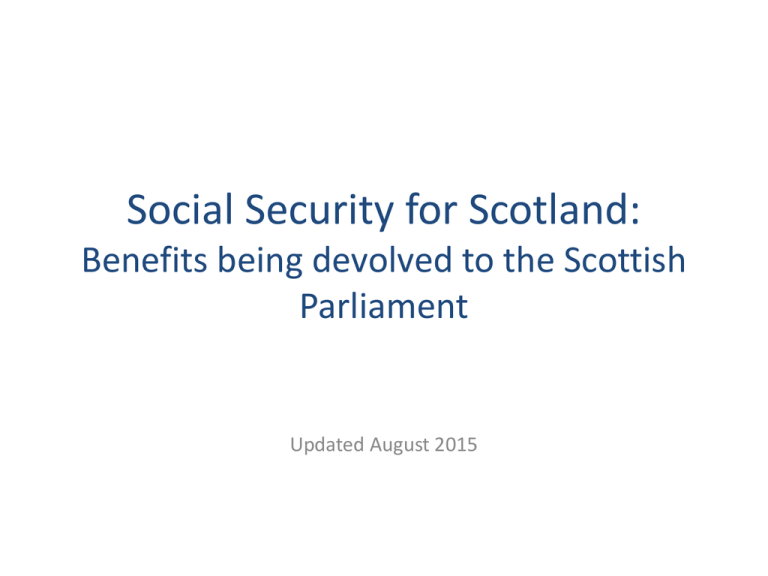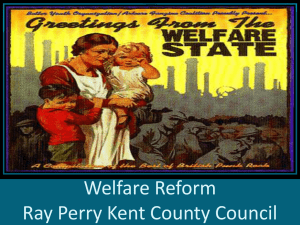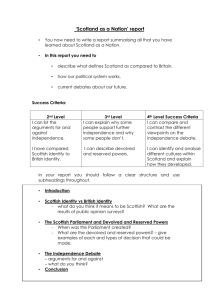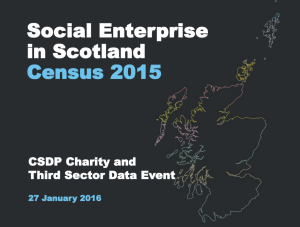Open - The Scottish Government
advertisement

Social Security for Scotland: Benefits being devolved to the Scottish Parliament Updated August 2015 Introduction The purpose of this paper is to provide an initial examination of the benefits which are set to be devolved to Scotland under the Smith Commission recommendations. This analysis will be used to help inform our discussions on how best to take advantage of the new powers coming to Scotland. The paper is structured in the following way: • Brief background to the benefit system and the Smith Commission proposals; • Examination of the reserved/devolved split of benefit expenditure; • High-level statistics on each of the benefits to be devolved including expenditure data, caseload time series, breakdown by age and gender and key characteristics of claimants where the data is available; and • Analysis of the combinations of some of these benefits that individuals in Scotland currently receive. 2 Background to the benefit system The benefit system currently in place in Scotland is distributed across a number of recipient groups. The majority of these benefits are currently reserved to the UK Government, with the exception of the Council Tax Reduction and Scottish Welfare Fund which were localised and devolved respectively to the Scottish Government from April 2013. Benefits for people out of work Income Support In Work Credit & Return to Work Credit Job Grant Jobseekers Allowance Benefits for elderly people Financial Assistance Scheme Pension Credit State Pension State Pension Transfers TV Licences Winter Fuel Payments Benefits for people who are ill or disabled Attendance Allowance Carer’s Allowance Disability Living Allowance Employment & Support Allowance Incapacity Benefit Industrial Injuries Personal Independence Payment Severe Disablement Allowance Specialised Vehicles fund Statutory Sick Pay Vaccine Damage Payments Benefits for families with children Child Benefit Child Tax Credit Guardians Allowance Maternity Allowance Statutory Maternity Pay Source: Expert Working Group on Welfare, Re-thinking Welfare: Fair, Personal and Simple. Benefits for people on low incomes Council Tax Reduction Discretionary Housing Payments New Deal & Employment Programme Allowances New Enterprise Allowance Scottish Welfare Fund Social Fund (regulated) Working Tax Credit Housing Benefit Other Bereavement benefits Christmas bonus Universal Credit Other small benefits such as child trust fund etc. 3 The Smith Commission The Smith Commission was tasked with providing recommendations on potential financial, welfare and taxation powers that could be devolved to Scotland, following the independence referendum. Their Heads of Agreement, published on 27 November 2014, detailed a number of recommendations in relation to social security. These included the recommendation that the Scottish Parliament be given complete autonomy to determine the structure and value of a range of powers over disability, and devolution of the components of the regulated social fund. In addition, the Scottish Parliament should be given the power to make administrative changes to Universal Credit and to vary the housing cost element. The Commission also made clear recommendations that the Scottish Parliament be given powers to create new benefits in areas of devolved responsibility, and top-up reserved ones. For carers, disabled people & those who are ill Currently part of the Regulated Social Fund Other Attendance Allowance (AA) Cold Weather Payment (CWP) Discretionary Housing Payments (DHP) Carer’s Allowance (CA) Funeral Payment (FP) Disability Living Allowance (DLA) Sure Start Maternity Grant (SSMG) Personal Independence Payment (PIP) Winter Fuel Payment (WFP) Industrial Injuries Disablement Benefit (IIDB) Severe Disablement Allowance (SDA) Source: The Smith Commission, Report of the Smith Commission for further devolution of powers to the Scottish Parliament. 4 Benefit expenditure in Scotland – 2013/14 In 2013/14, £205.2 billion was spent on benefits in Great Britain, of which £17.5 billion (8.5 per cent) was spent on individuals in Scotland. The Commission’s proposals would devolve around £2.6 billion (14.6 per cent) of Scottish benefit expenditure to the Scottish Parliament. These figures exclude nearly £400 million of expenditure on the Council Tax Reduction Scheme and Scottish Welfare Fund which are already devolved to the Scottish Parliament. If they are included, total benefit expenditure in Scotland in 2013/14 was around £17.9 billion. Rest of GB, £187.6bn, 91.5% Scotland; £17.5bn; 8.5% Reserved, £14.9bn, 85.4% Devolved, £2.6bn, 14.6% Note: fi gures may not sum due to rounding Sources: DWP Outturn and Forecast: Autumn Statement 2015, DWP benefit expenditure by Region 1996/97 to 2013/14, HMRC Tax Receipts between England, Wales, Scotland & Northern Ireland, Scottish Welfare Fund Statistics: 2013/14, Council Tax Reduction: Caseload and Expenditure 2013/14. 5 Benefit expenditure in Scotland – 2013/14 The size of expenditure on each benefit to be devolved varies considerably. Nearly £1.5 billion was spent on Disability Living Allowance in 2013/14, accounting for almost 60% of total expenditure on the benefits to be devolved. This is in comparison to the less than £1 million spent on Cold Weather Payments in 2013/14. £1,600 £1,473 £1,200 £1,000 £800 £600 £481 £29 £10 £6 £3 <£1 Sure start maternity grant Cold weather payments £91 Funeral expenses payments £91 Personal independence payment £182 Discretionary housing payments £186 £200 Industrial injuries benefits £400 Severe disablement allowance Expenditure, 2013/14 (£m) £1,400 Carer's allowance Winter Fuel Payments Attendance allowance Disability living allowance £0 Source: DWP benefit expenditure by region from 2000/01 to 2013/14. industrial Injuries benefits includes IIDB. A further breakdown is unavailable. 6 Benefit to be devolved to Scotland Group Benefit For carers, disabled people & those who are ill Attendance allowance Carer’s Allowance Disability Living Allowance Personal Independence Payment Industrial Injuries Disablement Benefit Severe Disablement Allowance part of the Other Currently Regulated Social Fund Cold Weather Payment Funeral Payment Sure Start Maternity Grant Winter Fuel Payment Discretionary Housing Payments Source: www.gov.uk Primary Purpose To help with personal care for individuals aged 65 or over with a physical or mental disability. To help an individual look after someone with substantial caring needs. To be eligible the individual must be 16 or over and spend at least 35 hours a week caring for them. Help if your disability or health condition means one or both of the following are true: You need help looking after yourself You have walking difficulties DLA is closed to new working age claimants and being replaced by PIP. Helps with some of the extra costs caused by long-term illhealth or disability for individuals aged 16 to 64. Replacement for DLA for working age individuals. For individuals who are ill or disabled as a result of an accident or disease caused by work or while you were on an approved employment training scheme or course. For working age individuals who are unable to work due to illness or disability. SDA is closed to new entrants A payment for individuals on certain benefits when the temperature is either recorded as, or forecast to be, an average of zero degrees Celsius or below over 7 consecutive days. For individuals on low income and needing help to pay for a funeral they are arranging. A one off payment of £500 to help towards the costs of having your first child for individuals who are in receipt of certain benefits. A tax-free payment to help pay for heating bills if you were born on or before 5 July 1952 (Current SPA for women). Additional help for those in receipt of Housing Benefit and having difficulty meeting their rent payments. Paid at the discretion of the LA. 7 Disability Living Allowance in Scotland – Feb 2015 DLA provides help for an individual if their disability or health condition means one or both of the following are true: They need help looking after their self or have walking difficulties. DLA is closed to new claimants and being replaced by PIP. 300 51% 100 Age range May-14 May-13 May-12 May-11 May-10 May-09 May-08 There are a wide range of main disabling conditions for DLA with arthritis and learning difficulties being the most common. Learning Other 31% Chest Disease 3% Under 5 5 to under… 11 to… 16 - 17 18 - 24 25 - 29 30 - 34 35 - 39 40 - 44 45 - 49 50 - 54 55 - 59 60 - 64 65 - 69 70 - 74 75 - 79 80 - 84 85 - 89 90 and over Number of claimants (Thousands) May-07 May-06 May-05 May-04 May-03 0 52% of all DLA claimants are aged 50 to 75. 50 40 30 20 10 0 49% 330,270 individuals received DLA in Feb 2015 200 Difficulties 12% Mobility Rate Higher Psychosis 8% Cerebrovascular Disease 4% Heart Disease 4% Back Pain 4% Arthritis 17% Neurological Diseases 4% 77% of DLA claimants are in receipt of both the Mobility and Care elements of DLA. Psychoneurosis 8% Disease Of The Muscles, Bones or Joints 5% Care Award Rate The majority (82%) of claimants have been receiving DLA for over 5 years, with 14% receiving DLA for between 2 to 5 years. 400 May-02 Number of claimants (Thousands) In 2013/14 £1.5bn was spent on DLA in Scotland, 10.7% of the GB total which is more than Scotland’s population share (8.4%). Gender split DLA caseload steadily increased between May 2002 and May 2013 and has started to fall as a result of the introduction of PIP. Lower Nil Higher 17% 7% 1% Middle 16% 16% 3% Lower 11% 9% 6% Nil 10% 3% 0% Sources: DWP benefit expenditure by local authority from 2000/01 to 2013/14 and DWP tabulation tool. Note: caseload data relates to cases in payment . 8 Personal Independence in Scotland – April 2015 PIP helps with some of the extra costs caused by long-term ill-health or disability for individuals aged 16 to 64. It is also replacing DLA for working age individuals. Only 14% of current PIP claimants have been reassessed from DLA. 9% of current PIP claimants are classed as being terminally ill. 72% of all PIP claimants are aged 40 to 64. 65 and over 60-64 55-59 50-54 45-49 40-44 35-39 30-34 25-29 18-24 16-17 10,000 8,000 6,000 4,000 2,000 - 47,646 individuals received PIP in April 2015 25,000 20,000 15,000 10,000 5,000 - 54% There are a wide range of main disabling conditions for PIP with psychiatric disorders being the most common. Respiratory disease; 5% Other; 6% Neurological disease; 10% Musculoskel etal disease (regional); 11% Cardiovascul ar disease; 3% Psychiatric disorders; 34% Malignant Musculoskel disease; etal disease (general); 12% 18% 46% 57% of PIP claimants are in receipt of both the mobility and daily living elements of PIP. Mobility Award Rate Enhanced Standard Daily Living Award Rate Number of claimants In 2013/14 around £10m was spent on PIP in Scotland. Number of claimants Gender split PIP was introduced in June 2013 to Scotland for new claims. Its caseload will continue to increase as DLA claimants are reassessed onto PIP . 30,000 Nil Enhanced 26% 11% 16% Standard 6% 14% 19% Nil 2% 6% 0% Sources: DWP Outturn and Forecast: Autumn Statement 2015 and DWP Stat-Xplore. Note: caseload data relates to cases in payment . 9 Attendance Allowance in Scotland – Feb 2015 AA provides help with personal care for individuals aged 65 or over with a physical or mental disability. 50% of all claimants have been receiving AA for over 5 years, with over a quarter (24%) receiving AA for between 2 to 5 years. 175 150 125 100 75 50 25 0 Number of claimants (Thousands) May-14 May-13 May-12 May-11 May-10 May-09 May-08 May-07 May-06 May-05 May-04 May-03 There are a wide range of main disabling conditions for AA with arthritis being the most common. Other 31% 40 Arthritis 32% Cerebrovasc ular Disease 6% Chest Disease 7% 20 10 0 Age range 35% 128,960 individuals received AA in Feb 2015 63% of all AA claimants are aged over 80. 30 Gender split 65% May-02 Number of claimants (Thousands) In 2013/14 £481m was spent on AA in Scotland, 9% of the GB total which is slightly more than Scotland’s population share (8.4%). AA caseload has generally declined since reaching a peak in November 2009 of 148,030 claimants. Disease Of The Muscles, Bones or Joints 7% Dementia 8% 62% of AA claimants receive the higher rate of care, meaning they require both day and night care or are terminally ill. Heart Disease 9% Sources: DWP benefit expenditure by local authority from 2000/01 to 2013/14 and DWP tabulation tool. Note: caseload data relates to cases in payment. 10 Carers Allowance in Scotland – Feb 2015 CA is provided to help an individual look after someone with substantial caring needs. To be eligible the individual must be 16 or over and spend at least 35 hours a week caring for them. 70 60 50 40 30 20 10 0 31% 69% The majority (65%) of claimants have been receiving CA for over 2 years, with 37% receiving CA for over 5 years. Jun-14 Aug-13 Oct-12 Dec-11 Feb-11 Apr-10 Jun-09 Aug-08 Oct-07 Dec-06 Feb-06 Apr-05 Jun-04 62,870 individuals received CA in Feb 2015 Aug-03 Number of claimants (Thousands) In 2013/14 £182m was spent on CA in Scotland, 8.7% of the GB total which is slightly more than Scotland’s population share (8.4%). Gender split CA caseload has been increasing steadily over the last decade. 41% of CA claimants are entitled to CA but do not receive a CA payment. This is because they are also in receipt of another benefit, such as State Pension, JSA or ESA ,which provide a higher level of income. Number of claimants (Thousands) Over half (57%) of all CA claimants are aged 40 to 59. 10 8 Unclaimed 41% 6 4 2 Claimed 59% 0 Age range Sources: DWP benefit expenditure by local authority from 2000/01 to 2013/14 and DWP tabulation tool. Note: caseload data relates to cases in payment. Severe Disablement Allowance in Scotland – Feb 2015 SDA is for working age individuals who are unable to work due to illness or disability. It was clsoed to new entrants and the provision replaced by Incapacity Benefit in April 2001, which is now replaced by Employment and Support Allowance. In 2013/14 £91m was spent on SDA in Scotland, 10.6% of the GB total which is more than Scotland’s population share (8.4%). Number of claimants (Thousands) SDA caseload is falling as it is closed to new claimants. Gender split 15,100 individuals received SDA in Feb 2015 50 40 30 56% 20 44% 10 Number of claimants (Thousands) Individuals aged 35 to 44 account for just over a quarter (25%) of all SDA claimants. 4 3.5 3 2.5 2 1.5 1 0.5 0 16-17 18-24 25-34 35-44 45-49 50-54 55-59 60-64 65 and over Age range Aug-14 Aug-13 Aug-12 Aug-11 Aug-10 Aug-09 Aug-08 Aug-07 Aug-06 Aug-05 Aug-04 Aug-03 Aug-02 Aug-01 Aug-00 Aug-99 0 There are a wide range of causes of incapacity for SDA with mental and behavioural disorders being the most common. Diseases of the Musculoskeletal system and Connective Congenital Tissue; Malformations, 6% Deformations and Chromosomal Abnormalities; 6% Diseases of the Nervous System; 10% Sources: DWP benefit expenditure by local authority from 2000/01 to 2013/14 and DWP tabulation tool. Other; 11% Menta l a nd behavi oural di s orders; 44% Unclassified symptoms etc; 23% Industrial Injuries Disablement Benefit in Scotland – Q4 2014 IIDB is for individuals who are ill or disabled as a result of an accident or disease caused by work or while they were on an approved employment training scheme or course. 35,000 30,000 17% 25,000 20,000 15,000 10,000 5,000 0 Osteoarthritis of the knee included in the regulations 2,500 2,000 480 new IIDB claims in Q4 2014 1,500 1,000 500 0 Diseases are the most common qualifying condition for IIDB accounting for 60% of all new claims. However, accidents account for 40% of all new working age claims. New Industrial Injuries Disablement Claims 3,500 2002 Q2 2002 Q4 2003 Q2 2003 Q4 2004 Q2 2004 Q4 2005 Q2 2005 Q4 2006 Q2 2006 Q4 2007 Q2 2007 Q4 2008 Q2 2008 Q4 2009 Q2 2009 Q4 2010 Q2 2010 Q4 2011 Q2 2011 Q4 2012 Q2 2012 Q4 2013 Q2 2013 Q4 2014 Q2 New Industrial Injuries Disablement claims The number of new claimants has been on a general downward trend since 2002. 3,000 83% 27,220 individuals received IIDB in QQ 2014 Q1 2010 Q2 2010 Q3 2010 Q4 2010 Q1 2011 Q2 2011 Q3 2011 Q4 2011 Q1 2012 Q2 2012 Q3 2012 Q4 2012 Q1 2013 Q2 2013 Q3 2013 Q4 2013 Q1 2014 Q2 2014 Q3 2014 Q4 2014 Industrial Injuries Disablement claims in payment In 2013/14 £91m was spent on IIDB in Scotland, around 10% of the GB total which is slightly more than Scotland’s population share (8.4%). Gender split The number of IIDB claims in payment has been slowly decreasing since 2010. 300 250 200 150 100 50 0 Diseases Accidents Qualifying condition Work ing age Pension age Sources: DWP benefit expenditure by local authority from 2000/01 to 2013/14, DWP Industrial Injuries Disablement Benefit quarterly statistics. 13 Discretionary Housing Payments in Scotland – 2014/15 DHPs provide additional help for those in receipt of Housing Benefit and having difficulty meeting their rent payments. It is paid at the discretion of the Local Authority. In 2014/15 there were around 118,000 DHP awards in Scotland. In 2014/15 £51m was spent on DHPs in Scotland. A significant proportion of this is likely to have been to counter the effects of the “Bedroom Tax”. The Scottish Government provided most of the funding for DHPs in 2014/15 The average DHP award in Scotland in 2014/15 was £429, up from £335 in 2013/14. Between 1 April 2014 and 31 March 2015: Local Authorities received a total of around 132,000 applications for DHPs; LAs made determinations on around 130,000 DHP applications , SG funding; £35m, 70% UKG funding; £15m, 30% although some of these determinations may have been on applications which commenced prior to 1 April 2014; 118,000 DHP awards were granted during the period. This figure is likely to include a sizeable number of cases affected by the RSRS, where local authorities have continued to make up their shortfall in weekly rent through the use of DHPs; The total value of these awards across Scotland was £ 50.5 million. Sources: DWP benefit expenditure by local authority from 2000/01 to 2013/14, Scottish Government Discretionary Housing Payments in Scotland: 1 April 2014 to 31 March 2015. 14 Winter Fuel Payment in Scotland – May 2014 WFP is a tax-free payment to help pay for heating bills if an individuals was born on or before 5 July 1952 (current State Pension Age for women). WFP caseload has remained broadly flat at around 1.1 million claimants since 2009/10 In 2013/14 £186m was spent on WFP in Scotland, 8.7% of the GB total which is very slightly more than Scotland’s population share (8.6%). Gender split Number of claimants 1,200,000 1,000,000 800,000 1,086,080 individuals received a WFP in 2013/14 600,000 55% 45% 400,000 200,000 0 2009/10 300,000 250,000 200,000 150,000 100,000 2011/12 2012/13 2013/14 The rate of WFP an individual receives depends on their age and circumstances. 500,000 450,000 Number of claimants Number of claimants WFP is payable to individuals over the female state pension age who have been residing in the UK during a specified week in September of that year. A fifth of claimants are aged over 80. 350,000 2010/11 400,000 350,000 Age of claimant 300,000 80+ 250,000 75-79 200,000 70-74 150,000 65-69 100,000 <65 50,000 50,000 - <65 65-69 70-74 Age ranges 75-79 80+ £100 £150 £200 £300 Benefit rate paid Sources: DWP benefit expenditure by local authority from 2000/01 to 2013/14, DWP Winter Fuel Payment: caseload and household figures 2013 to 2014. 15 Benefits currently part of the Regulated Social Fund – 2013/14 Cold Weather Payments (CWP), Funeral Payments (FP) and Sure Start Maternity Grants (SSMG) are all benefits currently administered through the UK Government Regulated Social Fund. Cold Weather Payment are payments for individuals on certain benefits when the temperature is either recorded as or forecast to be an average of zero degrees Celsius or below over 7 consecutive days. Funeral Payments are for individuals on low income and needing help to pay for a funeral they are arranging Sure Start Maternity Grant is a one off payment of £500 to help towards the costs of having your first child for individuals who are in receipt of certain benefits. Expenditure on CWP, FP and SSMG in Scotland (£ millions). GB CWP FP SSMG Scotland 8 <1 44 6 37 3 Annual GB expenditure for CWP (£m) It should be noted that expenditure on Cold Weather Payments are extremely volatile due to the payment being dependant on weather conditions. The chart below shows the changes in GB expenditure on cold weather payments from 2004/05 to in 2013/14. £500 GB Expenditure £450 £400 £350 £300 £250 £200 £150 £100 £50 £0 2004/05 2005/06 2006/07 2007/08 2008/09 2009/10 2010/11 2011/12 2012/13 2013/14 Source: DWP Outturn and Forecast: Autumn Statement 2015. 16 Benefit Combinations in Scotland – Feb 2015 Individuals can be in receipt of more than one benefit at any one time. As a result there will be interactions between any devolved and reserved benefits which may impact on individuals behaviours. Limited information is available on the combinations of benefits individuals receive with DWP data providing some data on their benefits, although with notable exceptions like Housing Benefit. This interaction is highlighted by 34% of claimants of the main DWP benefits claiming a benefit combination which includes a devolved benefits. State Pension only claimants account for the largest proportion (42%) of all claimants. 700,000 Number of claimants 600,000 500,000 400,000 300,000 200,000 100,000 Combinations containing only reserved benefits Combinations containing devolved benefits Sources: DWP tabulation tool Other Combination SDA only SDA and IS/PC IS/PC, IB and DLA IB and DLA DLA, SDA IS/PC, CA and SP IS/PC, DLA and SDA CA and SP IS/PC and CA CA only IS/PC, SP and DLA IS/PC, SP and AA SP and DLA DLA only SP and AA ESA and DLA IS/PC and IB IB only WA only IS/PC only SP and PC/IS JSA only ESA SP only 0 Sources Department for Work and Pensions (DWP), Benefit expenditure by local authority 2000/01 to 2013/14. [Accessed 20 August 2015] https://www.gov.uk/government/statistics/benefit-expenditure-and-caseload-tables-2014 DWP, Benefit expenditure by region 1996/97 to 2013/14. [Accessed 20 August 2015] https://www.gov.uk/government/statistics/benefit-expenditure-and-caseload-tables-2014 DWP, DWP Tabulation Tool. [Accessed 20 August 2015] http://tabulation-tool.dwp.gov.uk/100pc/tabtool.html DWP, Industrial Injuries Disablement Benefit: quarterly statistics. [Accessed 20 August 2015] https://www.gov.uk/government/collections/industrial-injuries-disablement-benefit-quarterly-statistics DWP, Outturn and forecast: Autumn Statement 20145 [Accessed 20 August 2015] https://www.gov.uk/government/statistics/benefit-expenditure-and-caseload-tables-2015 DWP, Stat-Xplore. [Accessed 20 August 2015] https://stat-xplore.dwp.gov.uk/ DWP, Winter Fuel Payment: caseload and household figures 2013 to 2014, 17 September 2014. https://www.gov.uk/government/statistics/winter-fuel-payment-caseload-and-household-figures-2013-to-2014 HMRC, Disaggregation of HMRC Tax Receipts: statistics table. [Accessed 20 August 2015] https://www.gov.uk/government/statistics/disaggregation-of-hmrc-tax-receipts Expert Working Group on Welfare, Re-thinking Welfare: Fair, Personal & Simple, 4 June 2014. http://www.gov.scot/Publications/2014/06/7760 Scottish Government, Discretionary Housing Payments in Scotland: 1 April 2013 to 31 March 2014 [Accessed 5 March 2015] http://www.gov.scot/Topics/Statistics/Browse/Social-Welfare/dhp/DHP31Mar2014 Scottish Government, Scottish Welfare Fund Statistics: 2013/14, 15 July 2014. http://www.gov.scot/Topics/Statistics/Browse/Social-Welfare/swf/SWF20132014 Scottish Government, Council Tax Reduction: Caseload and Expenditure, Scotland, 2013/14, 24 June 2014. http://www.gov.scot/Publications/2014/06/5122 The Smith Commission, Report of the Smith Commission for further devolution of powers to the Scottish Parliament , 27 November 2014. https://www.smith-commission.scot/ UK Government, www.gov.uk 18 List of abbreviations AA Attendance Allowance SP State Pension CA Carer’s Allowance SPA State Pension Age CWP Cold Weather Payment SSMG Sure Start Maternity Grant DHP Discretionary Housing Payments WA Widow’s Allowance DLA Disability Living Allowance WFP Winter Fuel Payment DWP Department for Work & Pensions ESA Employment & Support Allowance FP Funeral Payment IB Incapacity Benefit IIDB Industrial Injuries Disablement Benefit IS Income Support JSA Jobseeker’s Allowance PC Pension Credit PIP Personal Independence Payment SDA Severe Disablement Allowance 19







